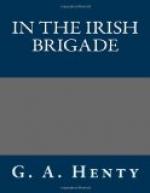“Therefore, sir, I think that, in the present case, I can make an exception to the rule. In an hour I shall mount and ride down the road to Badajos, and I shall there restore your liberty to you, and permit you to recross the frontier. It would be a thousand pities that so young and gallant an officer should waste, perhaps, some years of his life in an English prison, for the number of prisoners taken in Flanders is so great that it is impossible for the French to find officers to exchange for them. You will understand that, dealing with allies so jealous and susceptible as the Portuguese, I can hardly take the step of releasing you, as it would be at once rumoured that I had been in communication with a French officer, doubtless from some sinister motive.
“I think, Captain Kennedy, that it would be as well,” he said with a smile, “that you should withdraw your parole, and do so before we start, in the presence of the officers of my staff. Of course, you must be placed under a very strict guard, and although so near the frontier, you will find it very difficult to escape. Still, such things are managed.”
“I thank you most deeply, sir,” Desmond said, understanding the tone in which the earl spoke, “and I shall ever retain a deep feeling of gratitude for your generosity.”
When the party assembled, in readiness to mount, Desmond walked up to the earl, and said in a tone that could be heard by the officers round:
“Sir, I have changed my mind, and beg to be allowed to withdraw my parole.”
“You are at liberty to do so, Captain Kennedy; but nevertheless I shall take you with us today. I shall not, of course, ask you to give any information as to matters on the other side of the frontier, but there are points on which you could inform me, without detriment to your friends.”
“That I shall be happy to do, sir.”
The earl called up four troopers.
“You will place this officer and his servant between you,” he said, “and keep a vigilant lookout upon their movements.”
Desmond had not even told Mike of the conversation with the earl, thinking it better that he should remain in ignorance that this escape was connived at by an English general, and his follower was therefore greatly astonished when he heard that his master had withdrawn his parole, and that they were henceforth to be strictly guarded. The party rode until they reached a rise from which they could obtain a view of Badajos, and of the country extending far up the valley of the Guadiana. The ground in front of them sloped gradually.
The earl took his place with two or three officers of his staff, fifty yards in front of the rest, and, dismounting, examined Badajos with his telescope. Then he asked one of his aides-de-camp to bring Captain Kennedy to him.
“You may as well bring his servant, too,” he added. “No doubt he knows the country as well as his master does, and may not be so unwilling to answer questions.”




